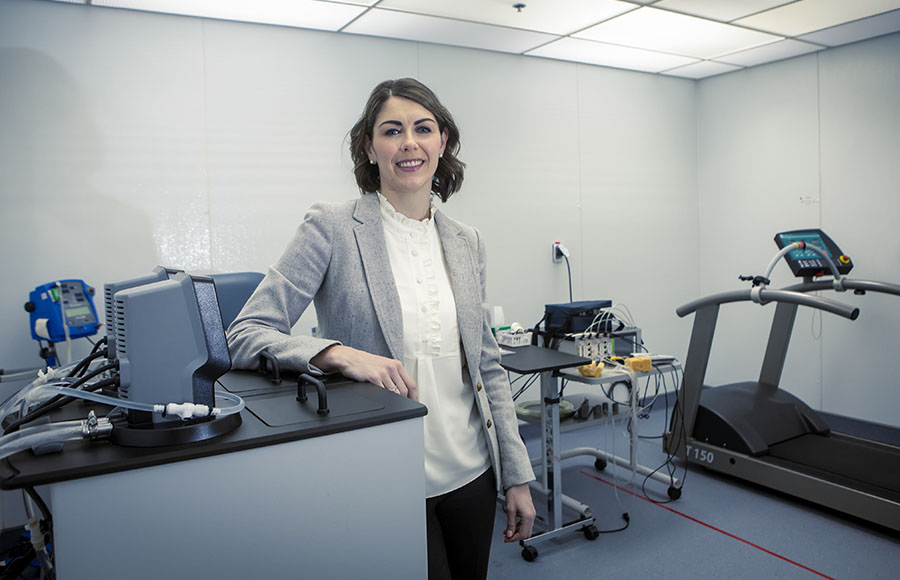
Dr. Caroline Smith, associate professor in Appalachian State University’s Department of Health and Exercise Science, has received the 2021 University of North Carolina Board of Governors Excellence in Teaching Award. She is pictured in the environmental chamber of the Thermal and Microvascular Physiology Laboratory in App State’s Leon Levine Hall of Health Sciences. The chamber can be used to simulate different environments by changing the temperature, humidity and oxygen concentration — allowing researchers to measure cardiovascular, sweating and skin blood flow responses of subjects. Photo by Marie Freeman
BOONE, N.C. — Dr. Caroline Smith, associate professor in Appalachian State University’s Department of Health and Exercise Science and director of the university’s Thermal and Microvascular Physiology Laboratory, has received the 2021 University of North Carolina Board of Governors Excellence in Teaching Award.
Each year, one faculty member from each of the University of North Carolina System’s 17 constituent institutions are named for the award and receive a $12,500 cash prize. Six additional App State faculty members are also honored with campus-based awards.
“Dr. Smith’s focus on engaging her students in real-world research makes her an exemplar for our campus,” said App State Chancellor Sheri Everts. “I applaud Dr. Smith and the expert faculty at App State like her, who adapted and thrived this year amid the challenges presented by a global pandemic, and I am proud to see her work recognized by the Board of Governors.”
Smith will receive her award during App State’s Spring 2021 Commencement, at the May 7 ceremony to be held at 5 p.m. — one of several in-person ceremonies that will honor Class of 2021 graduates.
App State Interim Provost and Executive Vice Chancellor Heather Hulburt Norris said, “I am thrilled to see all Dr. Smith has achieved. Her continued hard work and dedication, in and out of the classroom, has made a lasting impression on students, colleagues and the broader university community.”
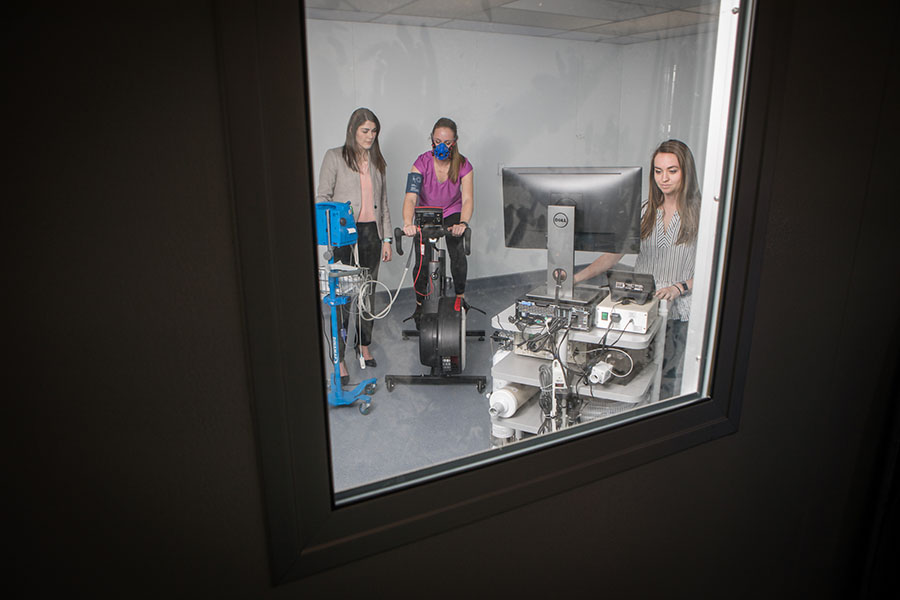
During a lab session in 2019, Appalachian State University alumna Megan Campany ’19, who graduated from summa cum laude with a B.S. in exercise science, center, exercises on a cycle ergometer inside the environmental chamber of the Thermal and Microvascular Physiology Laboratory in App State’s Leon Levine Hall of Health Sciences. Dr. Caroline Smith, associate professor in the Department of Health and Exercise Science at App State, left, supervises as alumna Nicole Oakley ’18 ’19, who earned an M.S. in exercise science from App State, measures Campany’s physiological responses. Photo by Marie Freeman
Campus-based awards for 6 other faculty
The Board of Governors also selected six other App Sate faculty to receive campus-based awards for their innovative teaching methods in the classroom, making a difference in the way students learn. The faculty were chosen after being nominated by their peers or App State students, administrators or alumni.
Brian Zimmer, senior lecturer in the university’s Department of Geological and Environmental Sciences, is the recipient of the Appalachian State University Excellence in Teaching Award with a $1,500 prize.
Winners of the Appalachian State University School/College Awards, with a prize of $1,000 each, are:
- Dr. Phillip Ardoin, professor in and chair of the Department of Government and Justice Studies.
- Dr. Sushmita Chatterjee, associate professor and director of the gender, women’s and sexuality studies program in the Department of Interdisciplinary Studies.
- Dr. Bonnie Guy, professor in the Department of Marketing and Supply Chain Management.
- Dr. Christine Leist, associate professor of music therapy in the Hayes School of Music.
- Dr. Patrick O’Shea, associate professor of instructional technology in the Department of Leadership and Educational Studies.
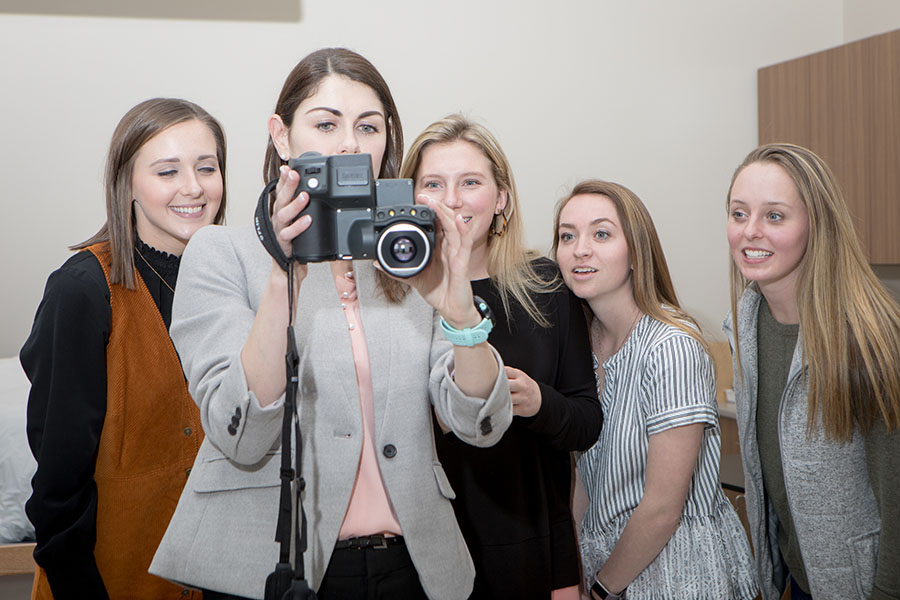
In this photo taken in spring 2019, Dr. Caroline Smith, associate professor in Appalachian State University’s Department of Health and Exercise Science, second from left, demonstrates to her exercise science students the use of an infrared camera to measure the surface temperature of objects. The pictured students — who have all since graduated from App State — are, from left to right: Kasey Kleiber ’17 ’19, Caroline Rushing ’18 ’19 and Nicole Oakley ’18 ’19, who each graduated with an M.S. in exercise science, and Megan Campany ’19, who earned a B.S. in exercise science. Photo by Marie Freeman
Dr. Caroline Smith — using research to develop critical thinking skills
Smith’s research in the Thermal and Microvascular Physiology Laboratory in App State’s Leon Levine Hall of Health Sciences focuses on thermal physiology — or temperature regulation of the human body — and has implications for such areas as apparel design for the health and safety of firefighters, first responders and occupational workers.
In the lab, she employs an environmental chamber to simulate different conditions by changing the temperature, humidity and oxygen concentration — allowing researchers to measure cardiovascular, sweating and skin blood flow responses of subjects.
Smith said she involves students in every stage of research, including design, recruitment of subjects, experimental procedures and analysis — helping them develop different skill sets to use in their future careers.
“Student engagement in research is fundamentally important for developing organizational, critical thinking and interpersonal skills,” Smith said.
Smith said she uses case studies and real-life applications in her classrooms to interactively train students to think critically. For instance, they might discuss temperature regulation of health care workers who have had to work long hours during the COVID-19 pandemic, wearing extra layers of PPE (personal protection equipment).
Smith often incorporates invited speakers into her classes, including individuals from the Centers for Disease Control and Prevention (CDC) and Yale University, to engage students and provide networking opportunities.
“I want my students to have a comprehensive understanding of concepts rather than simply memorizing course material. When they leave my class, the students understand how to approach a problem and think through the logic of the situation,” she said.
One of Smith’s former students, Megan Campany — who graduated summa cum laude with a Bachelor of Science in exercise science in 2019 and is now a medical student at the Mayo Clinic Alix School of Medicine in Scottsdale, Arizona — described Smith as a role model, a “powerful female in science and a groundbreaking researcher at Appalachian.”
“Dr. Smith has a skill set that enables engagement of an entire classroom in discussions of complex physiology, and also fosters a personal connection with students in a way that inspires dedication to learning and an eagerness for knowledge far beyond the confines of an upcoming examination,” Campany said.
Smith has been instrumental in leading efforts to redesign and develop selected courses within the exercise science curriculum.
Dr. Zachary Farris, assistant professor in the Department of Health and Exercise Science, said Smith makes improvements to courses well beyond her own. “She has continually motivated me to become a better, more engaging and more effective instructor,” he added.
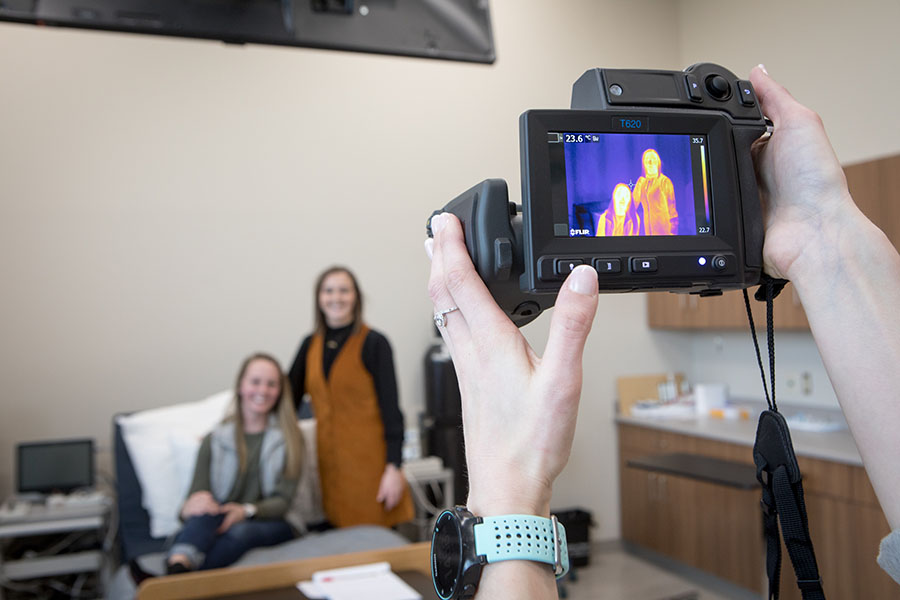
In the Thermal and Microvascular Physiology Laboratory at Appalachian State University, an infrared camera is used to measure the surface temperature of objects, including the skin temperature of individuals. In this photo taken in spring 2019, App State alumnae Megan Campany ’19, left, and Nicole Oakley ’18 ’19 serve as models for a sample infrared image. Campany earned a B.S. in exercise science, and Oakley earned an M.S. in exercise science. Photo by Marie Freeman
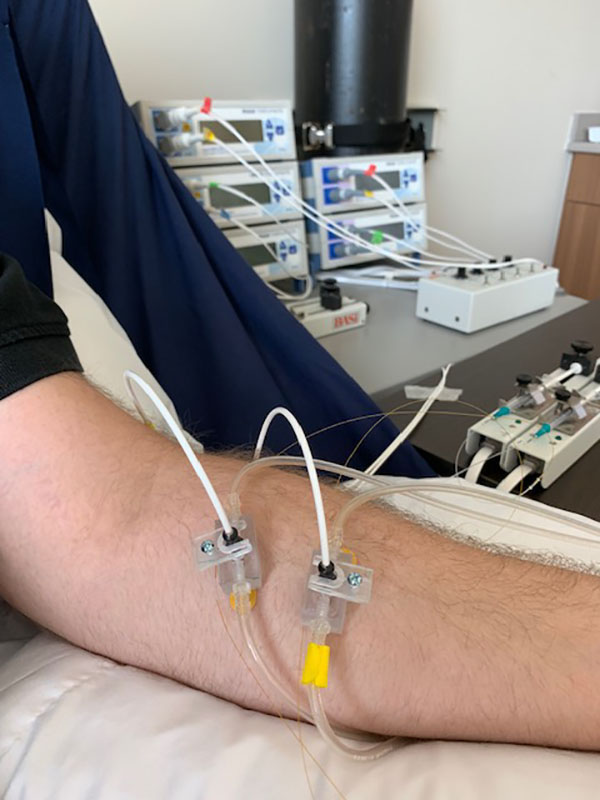
In the Thermal and Microvascular Physiology Laboratory at Appalachian State University, Dr. Caroline Smith, associate professor in the Department of Health and Exercise Science, and her students research temperature regulation in the human body. Pictured, microdialysis fibers are inserted into an individual’s skin to measure sweating rate and skin blood flow in response to changing environmental factors. Photo submitted
Teaching approach during COVID restrictions
During the pandemic, Smith took the UNC Digital Learning Design course to help her flip her course delivery methods to respond to different learning styles and the need to engage students in different ways. To assist students who had to modify their study habits during online learning, Smith said she completely changed how she delivered course material when classes shifted to online delivery. Some of her new methods included:
- Producing short videos to address challenging topics.
- Creating review videos asking students foundational knowledge questions.
- Holding live review sessions online for exam preparation.
- Optimizing breakout rooms during classes for small group discussions.
- Utilizing an online communication and engagement tool to encourage students to post their own video discussions about class content.
“In the current environment, it is necessary to develop a technical toolbox that keeps pace with ever-changing electronic delivery and software improvements,” Smith said.
While she looks forward to a full schedule of face-to-face teaching again, Smith said she will incorporate some of the more successful techniques learned while teaching online. According to Smith, “To be an effective educator, it is important to understand the needs of students, find innovative methods for engagement and improve proficiency and pedagogical approaches to both in-person and virtual learning.”
In 2013 Smith came to App State, where she said she could achieve a nice balance between research and teaching. Since then, she has taught a wide breadth of courses in the department at both the undergraduate and graduate level, and has taught in App State’s Honors College. She also serves as an adjunct professor at the Wake Forest School of Medicine.
Smith received her bachelor’s degree with honors in human biology and her Ph.D. in thermal physiology from Loughborough University in the UK, then completed a postdoctoral fellowship in thermal and microvascular physiology in Noll Laboratory at Pennsylvania State University.
She credits much of her academic success to Dr. George Havenith, director of the Environmental Ergonomics Research Centre at Loughborough University, and to Dr. Lacy Alexander and Dr. Larry Kenney at Penn State.
What do you think?
Share your feedback on this story.
About the Beaver College of Health Sciences
Appalachian State University’s Beaver College of Health Sciences (BCHS), opened in 2010, is transforming the health and quality of life for the communities it serves through interprofessional collaboration and innovation in teaching, scholarship, service and clinical outreach. The college enrolls more than 3,600 students and offers 10 undergraduate degree programs, nine graduate degree programs and four certificates across seven departments: Kinesiology, Nursing, Nutrition and Health Care Management, Public Health, Recreation Management and Physical Education, Rehabilitation Sciences, and Social Work. The college’s academic programs are located in the Holmes Convocation Center on App State’s main campus and the Levine Hall of Health Sciences, a state-of-the-art, 203,000-square-foot facility that is the cornerstone of Boone’s Wellness District. In addition, the college supports the Appalachian Institute for Health and Wellness and has collaborative partnerships with the Wake Forest University School of Medicine’s Physician Assistant Program, UNC Health Appalachian and numerous other health agencies. Learn more at https://healthsciences.appstate.edu.
About Appalachian State University
As a premier public institution, Appalachian State University prepares students to lead purposeful lives. App State is one of 17 campuses in the University of North Carolina System, with a national reputation for innovative teaching and opening access to a high-quality, cost-effective education. The university enrolls more than 21,000 students, has a low student-to-faculty ratio and offers more than 150 undergraduate and 80 graduate majors at its Boone and Hickory campuses and through App State Online. Learn more at https://www.appstate.edu.
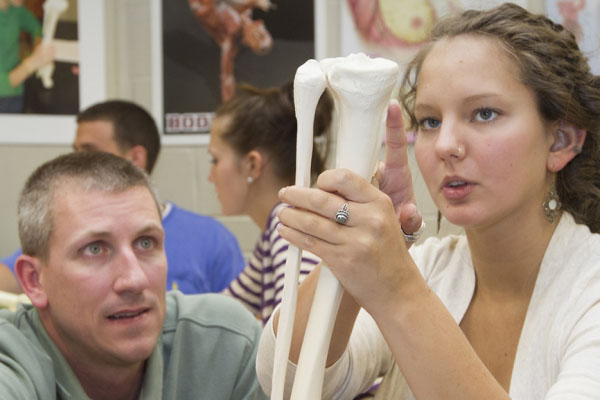



![How NCInnovation Is Rethinking Economic Development in North Carolina [faculty featured]](/_images/_posts/2026/02/rethinking-economic-development-600x400.jpg)







